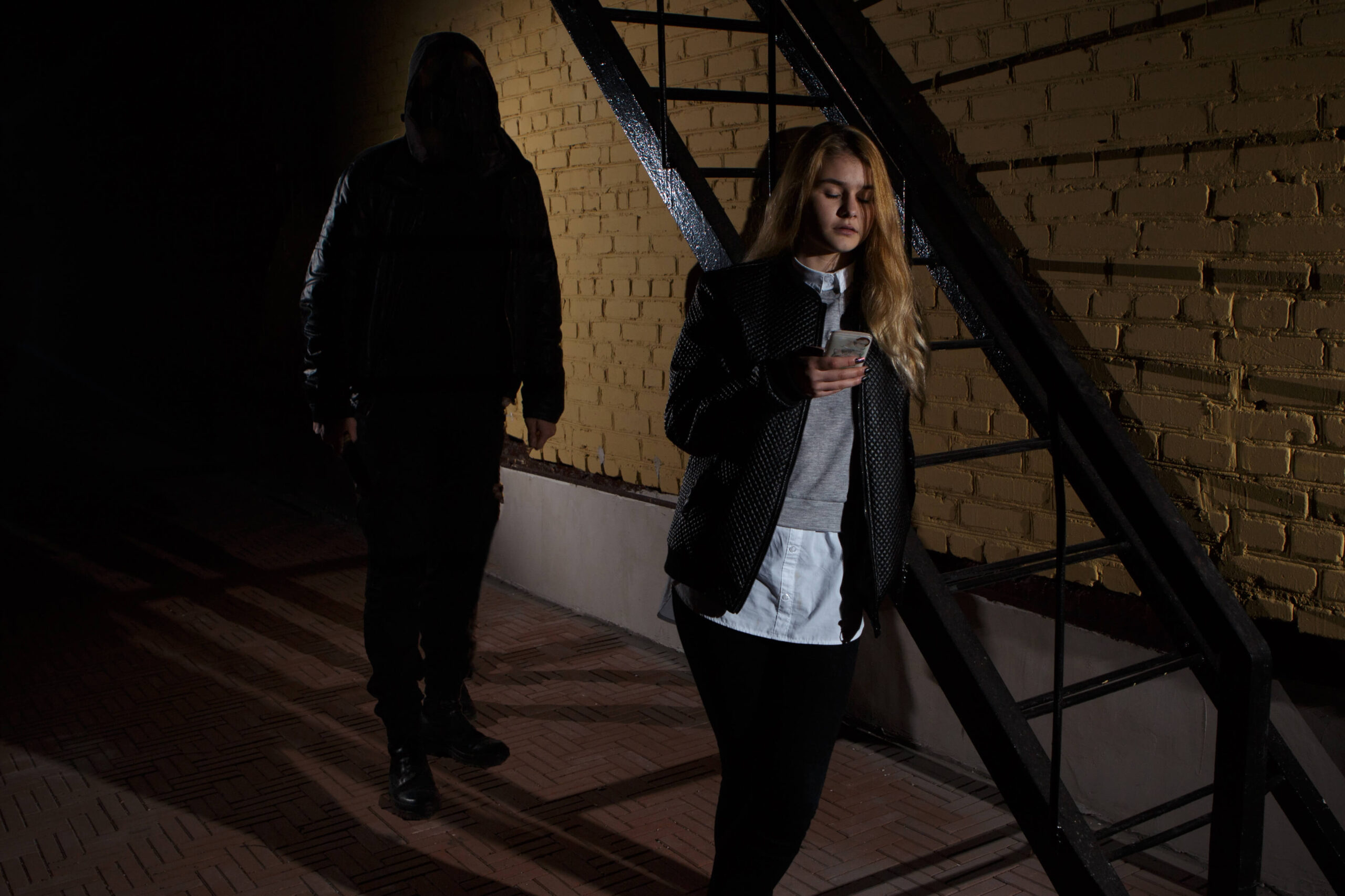Your Partner
in Legal Success
| Reading Time: 17 Minutes
Persistent Pursuit Crime and its Punishment

We invite you to read our article, “Persistent Pursuit Crime and its Punishment“, written by the MGC Legal team; here are the details…
What is Persistent Pursuit Crime?
Although the increasing number of femicides in our country and the legal dimension of the measures taken in this regard have been on the public agenda for a long time, the acts of violence against women, mostly by ex-spouses and/or ex-lovers, have diversified to such an extent that they cannot be handled only on the level of “physical violence“. It has become necessary to make new regulations and take further measures in this regard.
It has been bitterly experienced that in the majority of acts of violence that focus on women and children in general, the sad consequences in question can be foreseen before the events that result in death or serious injury to the victim.
As a matter of fact, it is known that in most of the violence cases in question, the victim is followed persistently by the perpetrator and is constantly and systematically harassed. However, it is obvious that the measures taken against the people who commit these acts are often not sufficient. The new crime regulation made in the Turkish Penal Code No. 5237 on 12.05.2022 is very important in order to prevent the said actions and thus to put an end to the murders and injuries that are often the last link of these actions. That being said, the only thing that can be done within the scope of criminal law is that these acts, which are the footsteps of violence, are included in the scope of crime and penalized as necessary.
In this context, in this article, we would like to convey our statements and opinions regarding the Turkish Penal Code article 123/A regulation made with Law No. 7406 dated 12/5/2022 to our esteemed readers.
The text of article 123/A of the Turkish Penal Code with the margin title “Persistent Pursuit” is as follows:
(1) From six months to two years imprisonment is given for the perpetrator who causes serious unease to a person or worries about the safety of themself or one of their relatives by persistently following physically or trying to contact by using communication tools, information systems, or third parties.
(2) Crime;
a) If it is committed against the child or the spouse from whom a separation decision has been made or divorced,
b) If caused the victim to change school, workplace, residence or quit school or work,
c) If it is committed by someone who has been banned from entering a residence, a school, or a place of employment, the punishment can range from one year to three years in prison.
(3) The investigation and prosecution of the crime regulated in this article depend on the victim’s complaint.
In the text of the article, the actions that will give rise to the crime of “Persistent Pursuit” are defined. In accordance with the principle of “Legality in Crime and Penalty“, typical actions specified in the law must occur for a crime to occur. This is a requirement of the typical elements of the crime. In other words, in order for us to talk about the formation of the crime, the actions defined in the legal regulation regarding the relevant crime must take place; otherwise, a crime cannot be mentioned.
Typicality consists of two elements. These are the material (the appearance of the action in the outer world) and the spiritual (the psychic-spiritual field of the perpetrator and their world of imagination).
The material elements of typicality are the act, the result, the causal link, the perpetrator, the victim, and the subject of the crime. The spiritual aspects are; intent, negligence, and motive. Below, the crime of stalking will be evaluated in terms of typicality and illegality.

Persistent Pursuit Crime in Terms of The Material Elements of The Offense
1. Action
Per the text of the article, we would like to convey our explanations regarding the nature of the acts organized within the scope of the crime under the following headings.
a. Classification by Number of Behavior
Persistent pursuit crime is regulated as an “elective act” regarding the number of actions constituting the crime. In the penalty norm, sometimes more than one movement is shown independently of each other. The realization of any of these constitutes a crime. In the text of the article, “physically following or trying to contact by using communication tools, information systems or third parties persistently“, and the regulation that a crime can be committed by the realization of any of these actions shows that the crime of persistent pursuit is regulated as an optional behavior crime.
Elective actions are physically following and trying to establish contact using communication tools, information systems, or third parties.
Further Reading: Information Technology Crimes.
The purpose of communication tools is to convey the feelings and thoughts of people. Social media, such as; Instagram, Twitter, and WhatsApp, which we use widely today, are also included in communication tools. Based on the fact that the legislator uses a general term instead of counting some of the communication and information systems, it can be said that the provision of article 123/A of the Turkish Penal Code can also be applied in terms of different communication tools and information systems that may appear in the future.
Especially today, the actions of some users on social media in the form of persistent messaging and trying to interact, reaching the level of harassment, have become widespread. This issue certainly falls within the scope of the said regulation.
If the perpetrator performs one or more of the elective acts specified, a crime will be deemed to have been committed. There is no difference between the two cases regarding the realization of the crime. However, suppose the crime is committed with a few optional acts specified in the law. In that case, it will be taken into account by the judge in determining the sentence under article 61 of the Turkish Penal Code.
Persistent pursuit crime, regulated by article 123/A of the Turkish Penal Code, is also a habitual crime type.
For us to talk about a habitual crime, the action must be repeated a certain number of times, showing the presence of the perpetrator’s obedience.
In terms of the crime of persistent pursuit, the follow-up must be carried out more than once in order for the follow-up to reach the level of persistence. In this sense, the crime of persistent pursuit is routine. As the Court of Cassation stated in a decision in which evaluations were made regarding the crime of disturbing the peace and tranquility of individuals, the birth of an element of persistence depends on the occurrence of the unlawful act more than once.
Again, the article’s justification is as follows: “Insistence means insisting on an idea or behavior, and it expresses the repetition of the actions specified in the article. Insistence is a criterion that expresses the extent to which the act necessitates punishment in terms of the content of injustice. This crime will not occur if the act that constitutes an injustice is carried out to a reasonable extent. In terms of the existence of insistence, it is optional to repeat the same action several times. The perpetrator may insistently repeat one of the elective acts specified in the article or show their will of insistence by repeating different elective acts at other places and times. The judge will determine whether the insistence factor has taken place or not within the framework of the concrete case.”
b. Classification by Type of Behavior
In terms of the form of the act, the types of crimes can be executive (active) or negligent (passive). Voluntary human behavior that brings about change in the external world manifests itself as either doing something, doing it, or not doing it.
Enforcement action violates the norms that appear as prohibitions and that order not to engage in behavior that disrupts the social order. In other words, positive behaviors that say “don’t commit” and break the prohibition rule give rise to perpetual crimes.
The acts that occur in the form of not fulfilling or not doing a legal obligation will give rise to negligence crimes. The provision of article 98 of the Turkish Penal Code with the margin title “Failure to Fulfill The Obligation of Assistance or Notification” is an example of a crime that can be committed by negligence.
The crime of “persistent pursuit”, which is the subject of our article, can be committed by executive action. As a matter of fact, when we look at the criminal acts regulated in the text of the article;
- Physically follow-up,
- Trying to contact using communication tools, information systems, or third parties.
It can be understood that this crime cannot be committed by negligence. For the perpetrator to commit the crime, they must act in violation of the order rules in the law.
c. Classification According to Whether The Execution of The Act Continues or Not
This crime is a sudden action crime depending on whether the execution of the act continues or not. Instant action crimes are completed with the realization of the typicality and end simultaneously (the execution of which does not continue). In this respect, persistent execution of the act of follow-up will be considered an act of execution, and with this, the crime will be completed.
In short, the crime will be completed with the realization of the actions that are regulated as criminal acts in the text of the article, and the result expressed as “…causing serious uneasiness on a person or worrying about the safety of themself or one of their relatives…“.
2. Result
The change that takes place in the outside world, apart from the act that gave rise to the act, is the result. The consequences caused by criminal acts are called “result” in criminal law terminology.
In terms of this crime, the result regulated in the text of the article is that there is a serious uneasiness in the victim and that the victim is concerned about the safety of themself or one of their relatives.
Thus, the crime of persistent pursuit, which is separated from the crime of “Disturbing The Peace and Tranquility of People” regulated following article 123 of the Turkish Penal Code, is a crime of “harm” in this respect. This issue is mentioned in the justification of the provision of article 123/A of the Turkish Penal Code:
“Again, since the crime of persistent pursuit is regulated as a harm crime, it differs from the crime in Article 123, which is regulated as a danger crime.“
“A real harm occurs on the subject of the crime with the commission of the act that constitutes an injustice in damage crimes.“
The act that will constitute the crime must be objectively suitable to cause uneasiness or anxiety. Whether the act constitutes a crime or not should not be determined by the victim’s personal situation (subjective criterion). That is, in the text of the article, whether the actions described as “...persistently physically following or trying to contact using communication tools, information systems or third parties…” are suitable to cause uneasiness and anxiety are not evaluated by taking into account the personal characteristics of the victim. It will be examined whether it is suitable to cause uneasiness and anxiety in an average person under average conditions.
If the serious uneasiness or anxiety that will occur causes the victim to result in more serious or other results than the perpetrator intended, the person must act with negligence, at least in terms of this result, to be held responsible for it (Turkish Penal Code article 23). For example, if the victim’s mental health deteriorates due to serious discomfort or anxiety, aggravated crime provisions will be applied due to the result.
3. Perpetrator
There is no regulation in the law regarding the title of the perpetrator. Anyone can commit this crime, but in some cases, the legal situation of the perpetrator will make the crime qualified. These cases are; committing the crime against the spouse who has been separated or divorced and in the event that the perpetrator is suspended or a measure of not approaching the residence, school, or workplace is given.
4. Victim
Everyone can have victim status in terms of the crime of persistent pursuit.

Persistent Pursuit Crime in Terms of The Spiritual Elements of The Crime
It can be said that the crime of persistent pursuit can only be committed with intent. Caste is the knowing and willful realization of the elements in the legal definition of the crime (Turkish Penal Code article 21). In order for a crime to be committed by negligence, it must be specifically demonstrated by the Turkish Penal Code. In terms of the crime of persistent pursuit, there is no regulation that this crime can be committed by negligence.
Motive, aim, or purpose is an emotion or thought that precedes the caste and prepares the caste. As a rule, the motive is not a sought-after element for the formation of the crime. If we evaluate it in terms of the crime of persistent pursuit, the realization of this crime is not dependent on any motive.
As a matter of fact, in the justification of the article, “It is sufficient for the perpetrator to act deliberately for the crime of stalking to occur. The purpose for which the perpetrator has carried out the act of stalking is not important in terms of the occurrence of the crime.” statements in the form of the following also show that the perpetrator’s deliberate act is sufficient for the crime to occur and that no special motive is sought.
If the perpetrator has committed the act with sexual motives, they will be held responsible for the crime of sexual harassment, not the crime of stalking. In this sense, the motive of the perpetrator is a concept that the judge should especially evaluate.
What Are The Qualified Conditions of Persistent Pursuit Crime?
In the provision of article 123/A-2 of the Turkish Penal Code, qualified forms of stalking offenses that require more punishment are regulated. The relevant provision is as follows:
a) If it is committed against the child or the spouse from whom a separation decision has been made or divorced,
b) If caused the victim to change school, workplace, residence or quit school or work,
c) If it is committed by the perpetrator, against whom a decision to ban or not approach the residence, school, or workplace is decided, the perpetrator is sentenced to imprisonment from one year to three years.
As can be seen, with the amendment made in subparagraph (a), more severe penal sanctions are envisaged if the crime is committed against children and women, who are generally the focus of violence.
The regulation made in subparagraph (b), on the other hand, is included in the scope of qualified cases where the victim has to make certain changes in his daily life as a result of persistent follow-up.
Subparagraph (c) regulates the case of a precautionary decision taken against the person who committed the crime.
When the qualified cases are examined, it is seen that the perpetrator’s persistence and dangerousness are punished more severely.
Persistent Pursuit Crime in Terms of Unlawful Elements
Unlawfulness is the element that the act committed and found in accordance with the definition in the law is not allowed by the legal order, that this act is not considered permissible, and that it does not create conflict and conflict not only with the criminal law but also with the whole legal order.
The reasons for compliance with the law specified per the Turkish Penal Code make the act lawful by removing it from being a crime. These are mainly; fulfillment of the law (art. 24/1), execution of the legal order (art. 24/2), self-defense (art. 25/1), the exercise of the right (art. 26/1), and consent of the person concerned (art. 26/2).
It will be evaluated whether the provisions of the law mentioned above will find an area of application in the relevant crime.
- Fulfilling the law’s provision can be considered a reason for compliance with the law in terms of persistent pursuit. For example, it is the fulfillment of the provisions of the law in cases where notification is required by law or in cases where obligatory litigation arises, and it will not give rise to the crime of persistent pursuit.
- In the execution of a lawful order, if the given order does not constitute a crime, it is lawful.
- In terms of the use of the right, it will be determined whether the crime has occurred or not according to the conditions of the concrete case. As an example for this reason, in the case of residential and roofed workplace rents, the appropriate warning made by the lessor to the tenant in order to ensure the performance of the debt upon the default of the tenant in paying the due rent will not give rise to the crime of persistent pursuit.
In the crime of persistent pursuit, to make the consent of the person concerned legal, this consent must be given for an absolute right that can be disposed of, and the victim must be capable of expressing their consent. In the crime of persistent pursuit, the act of “committing against the child” will not become lawful with consent.
In our opinion, it is possible to do acts against the victim lawfully with the consent of the person concerned; the explicit consent of the victim will ensure this to the contacts made by the perpetrator.
Because it is seen in forensic medicine reports and psychological reports that the perpetrator and their free will generally suppress the victims of stalking crime is impaired in the decisions they make. Since the investigation and prosecution of the related crime are subject to complaint, it cannot be evaluated ex officio by the official authorities. This situation may cause problems in practice. This situation is called “dark field / black numbers in crime” in criminology.

Persistent Pursuit Crime in Terms of Attempt
The attempt is regulated under article 35 of the Turkish Penal Code. It can be defined as the failure to complete the execution of the crime for reasons beyond the perpetrator’s control. Attempting to pursue the crime of persistent pursuit is impossible because the actual action against the victim is described as a mere action. Actual offenses are complemented by the execution of the executive action by virtue of their nature. From this point of view, it is not possible to attempt these crimes.
Persistent Pursuit Crime in Terms of Affiliation
More than one person can commit the crime of persistent pursuit together, that is, to participate in the crime. In the text of article 123/A of the Turkish Penal Code, as it can be understood from the expression “trying to contact by using third parties“, the acts of the third person who is a partner in the crime will be evaluated according to the conditions of the concrete case.
If the acts of the third person in question are mandatory for the execution of the crime, in other words, if it is not possible to complete the crime without the acts of the third person, the third person will be punished as a “joint perpetrator” as if they had committed the crime alone.
However, if the actions of the third person are considered only as helping the perpetrator materially and morally in the execution of the crime, then the third person will be punished with the title of “helper”.
One can be the instigator in the crime of persistent pursuit. In this case, “the person who incites someone else to commit a crime is punished with the penalty of the crime committed“. (Turkish Penal Code article 38)
The instigator in the justification of article 38 of the Turkish Penal Code is defined as “a person who does not yet have an idea about committing a certain crime is persuaded to decide to commit this crime by someone else“.
Persistent Pursuing Crime in Terms of Community
In this crime, the provisions of the meeting will be applicable. If the perpetrator’s acts constituting the crime also constitute the legal elements of another crime (typicality), the perpetrator will also be responsible for this crime. However, in terms of some crimes, if the nature of the follow-up gives rise to a different crime, the perpetrator will not be held responsible for persistent pursuit but for the concrete crime whose legal elements are provided. As an example of these;
- If the perpetrator threatens the victim with their actions, they will be responsible for the crime of threat (Turkish Penal Code article 106).
- If the nature of the contact made by the perpetrator is insulting, the perpetrator will be responsible for this crime (Turkish Penal Code article 125).
- Regarding contact made with sexual motives, it is also necessary to be prosecuted not for stalking but for sexual harassment (Turkish Penal Code article 105).
- In cases where the perpetrator is a public official, if the perpetrator committed the crime with the abuse of power and influence arising from public office, the perpetrator is also responsible for this crime per the same kind of intellectual meeting provisions (Turkish Penal Code article 43/2).
- In terms of this crime, it is important whether the provisions of the chain crime will be applied or not. Because the insistence on the follow-up against the victim in order for the offense to arise is included in the legal expression, here, the persistence classification of the follow-up will be ensured by performing it more than once.

What is The Penalty For Persistent Pursuit Crime?
The basic form of stalking is punishable by imprisonment from six months to two years. The qualified state is punished with imprisonment from one year to three years.
Investigation and Prosecution of Pursuing Pursuit Crime
The prosecution and investigation of this crime are subject to complaint. This complaint must be made by the person who is the victim of the perpetrator’s unlawful acts. The victim must use this right within six months of learning about the perpetrator and the act, in accordance with the Code of Criminal Procedure provisions.
Pursuant to article 66 of the Turkish Penal Code, the crime of persistent pursuit is subject to a statute of limitations of eight years, and the complaint must be made within eight years in any case.
Persistent Pursuit Crime in Terms of Arrest Measure
According to the Turkish Penal Code, detention measures cannot be applied for crimes whose upper limit is not more than two years.
At this point, we need to evaluate in terms of the persistent pursuit crime. The upper limit of the penalty stipulated in the law for the provision of article 123/A-1 of the Turkish Penal Code, which regulates the basic form of the crime, is two years. Therefore, detention cannot be applied in terms of the basic form of the crime.
In addition, in the provision of article 123/A-2 of the Turkish Penal Code, the qualified cases of the crime of stalking are specified. An upper limit of three years has been determined for the penalty to be applied due to these qualified cases. This situation has removed the qualified version of the crime of stalking from the scope of the detention ban. Therefore, an arrest measure can now be applied against the person concerned if such a situation occurs.
Persistent Pursuit Crime in Terms of Forensic Control
In terms of judicial control measures, the upper limit of the penalty stipulated for the crime is not decisive. Judicial control measures may also be applied for crimes within the scope of the detention ban.
If it would be beneficial to order one or more judicial control measures against the person concerned, such a decision may be made. At this point, both the conditions of the concrete case and the outcome of the claims and defenses put forward in the process are the factors that will determine the result.

Persistent Pursuit Crime in Terms of Delay of Punishment
If we need to briefly touch on the institution of “deferral of prison sentence” regulated under Article 51 of the Turkish Penal Code;
(1) A person sentenced to a prison sentence of two years or less for the crime they have committed may be suspended. The upper limit of this period is three years for persons who have not completed the age of eighteen or who have completed the age of sixty-five at the time of the act. However, in order for the postponement decision to be made, the person;
a) Not having been previously sentenced to more than three months imprisonment for an intentional crime,
b) After committing the crime, there must be a conviction in the court that they will not commit the crime again due to the remorse they showed during the trial process.
(2) Postponement of punishment may be subject to the condition that the damage suffered by the victim or the public is completely remedied by restitution or compensation. In this case, the sentence continues to be served in the execution institution until the condition is fulfilled. If the condition is fulfilled, the convict is immediately released from the execution institution by the judge’s decision.
As it can be seen, if the person has not committed an intentional crime before and the sentence imposed on him is a sentence of two years or less, the judge may order the postponement of the penalty if they are convinced that the perpetrator will not commit the crime again.
In this case, the perpetrator’s punishment will not be executed. Suppose they act by the necessary obligations within the audit period to be determined between one and three years at the end of the period. In that case, the sentence in question will result as if it was executed.
In this case, a five-year audit period is in question. If an intentional crime is committed within the mentioned five-year period, both the execution of the previous crime is carried out, and the provisions of the new crime come into play. If no intentional crime is committed within these five years, at the end of five years, that crime is no longer recorded in the criminal record, and the result is as if no punishment was given.
What is The Persistent Pursuit Crime in Terms of Conciliation?
The “conciliation” institution, which is regulated following Article 253 of the Criminal Procedure Code, is the process in which the parties are brought together during the investigation process, and the conflict between the perpetrator and the victim is tried to be resolved through the mediation of an impartial mediator. In this process, the institution aims to end the conflict without the need for criminal processes by providing communication between the perpetrator and the victim.
According to Article 253 of the aforementioned Code of Criminal Procedure, not every crime will be subject to mediation, but mediation provisions can only be applied for crimes with certain characteristics. Persistent pursuit crime is not within the scope of mediation under Article 253/2 of the Criminal Procedure Code. The relevant provision is as follows:
“Even if the investigation and prosecution depend on the complaint, reconciliation cannot be made in crimes against sexual immunity and the crime of persistent pursuit.” (Article 123/A)
As can be seen, although the crime of persistent pursuit in accordance with the relevant regulation is a crime subject to complaint, it is specifically excluded from the scope of conciliation.
Further Reading: Economic Crimes in Turkish Criminal Law.
Keywords: Persistent Pursuit Crime, Persistent Pursuit, Pursuit Crime, Crime of Stalking, Persistent Stalking, Persistent Stalking Crime.
This article was translated from Turkish; click to see the original Turkish article, which also includes citations and Supreme Court Decisions about this topic.



